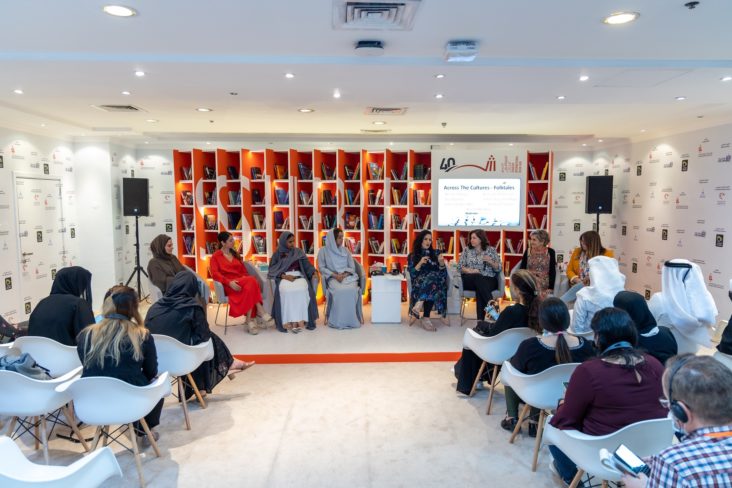Time To Make Folklore Relevant For Modern Times; Leading Writers From UAE, Lebanon And Spain Opine At An SIBF 2021

Knowledge without Borders (KwB), a Sharjah-based cultural initiative, facilitated a cultural discussion with leading Spanish, Emirati and Arab authors at the 40th Sharjah International Book Fair (SIBF),where writers highlighted that although traditional folk literature holds a special place in people’s hearts, it was time to make it relevant to keep pace with the needs of the modern times.
Speaking at the session, Marta Villegas, Spanish author of Womagis– an award-winning multilingual book featuring 18 languages, emphasised the importance of diversity in stories for children. She said: “I created Womagisso that kids can learn to accept and connect with people of diverse backgrounds. Womag is also fosters their creativity and imagination by motivating young readers to create a universe of their own.”
Emphasising that children must be encouraged to take responsibility for their actions, Emirati writer Reem AlMujadmi said: “In classic folk tales, characters are rewarded for doing good – but that is not always the case! It is essential to have stories that inculcate positive behaviour, irrespective of the outcome.”
She also pointed out that books must inspire children – irrespective of their gender – to be in touch with their emotions. “Books often portray boys as saviours who don’t cry, but we must change with the changing times and I tell my son, it is okay to shed tears.”
Echoing a similar thought was Barcelonian writer Iris Morata, who said: “Our society is growing and leaping into the future, but our folktales are not. We need books that are more relatable to the times we live in. When I read out to my kids, I change the traditional fairy tale ending so that it is not only the girl who waits for her Prince Charming; occasionally, the prince too must wait!”
Stating that stories have the power to change individuals, especially the ones that resonated with them as children, Lola Sanchez Ros, founder of the Spanish Book Club in Dubai, said: “The classic folk tales bring hope to the kids we were and the kids we are today. They teach us that if we believe in ourselves, our lives too can have a happy ending.”
Nadia Al Najjar, an Emirati award-winning author, explained that the Khararifor folktales from the UAE share similarities with that of other nations and cultures, and that it must be adapted to the changing times. She commented, “The idea of waiting for ‘the one’ persists even today. We must change the narrative of our stories to bring out the strengths of our women and girls too. One day, I will rewrite Cinderella, and in my story, the young girl will first complete her studies before setting out to meet the prince!”
Mariam Al Qasimi, Emirati author of Curious Adam, said it was important to think beyond one’s boundaries when sharing stories. She said: “What might be relevant in one language might not make sense in another culture. So, we must ensure that we retain the story’s essence in whatever language it is being translated to.”
Beirut-born Sahar Naja Mahfouz pointed out the importance of having characters in stories that children can relate to. Describing a personal experience, the writer said: “As a child, I had a friend with a birthmark on her face and I remember how much it affected her. In my book, The Kiss of an Angel, I describe how birthmarks appear when an angel kisses a baby inside the mother’s womb.I am moved when young children come up to me and say that an angel has kissed them on their hand or their neck!”
Panelists at the discussion further emphasised the need to nurture the culture of reading at a young age and called upon parents to foster an interest in books by reading out to their children.

